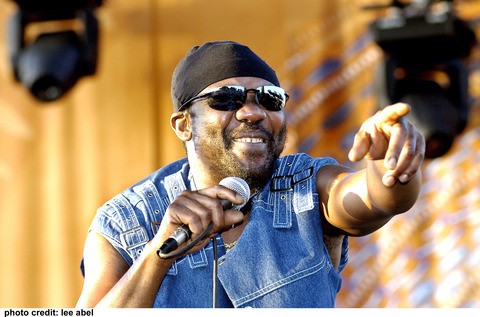
If you're sorely missing classic reggae in your life, it might be wise to plan a trip to Hermosa Beach to see Toots and the Maytals perform at Saint Rocke on Saturday, May 15. Read Drew Tewksbury's interview with the legend after the jump.
]
Toots Tells The Truth
by Drew Tewksbury
The digital age is all about copies. The endless well of the internet
inundates listeners with thousands of bands and musicians that copy
sounds, cover songs, and steal ideas from those who came before. The
availability of free MP3s, Youtube videos, and online streaming music
devalues most music as disposable commodities. If you get what you pay
for, and if you pay nothing, then you get nothing, right? Maybe. But
with all these endless copies metastasizing across the web, another
effect occurs: true innovators become invaluable.
Fredrick “Toots” Hibbert, founding member of Toots & the Maytals is
an originator, he is indispensable, and, if possible, should be
designated a monument. In Japan they deem certain people (artists,
dancers, musicians) as national treasures. Toots is undoubtedly a
treasure.
In 1968, Hibbert 's song “Do the Reggay” put a name to a
sound, introduced a new genre to the musical lexicon and crystallized
reggae as a relevant movement.
With a voice that gleaned sounds
the smoky sounds of soul, gospel and early R 'n' B, Hibbert mixed
spiritual call and responses with bouncing bass lines and playful guitar
lines. His indefatigable spirit kept reggae alive during his endless
tours.
But on the phone, Hibbert is exhausted. “I'm tired, man,”
the 64-year-old huffs from his room at the Houston Holiday Inn. The
tour has just begun, and he is resting before their show in a few hours.
The night before was a long set, the audience kept shouting requests.
“We
have to give them what they want, man,” Hibbert says.
With more
than four decades of music-making behind him, Hibbert's career is not an
arc or a constellation delineated by bright points and one hit wonders.
Instead, Hibbert's career is a cloud or a haze (an apt metaphor for the
ganja lover) that encompasses a general trajectory rather than a linear
path.
His music, he says, comes from an inner spiritual space
that he found while singing in the choir as a teenager.
“I come
from the church, my whole body is a church.”
His songs were
celebrations, and he stayed clear of the political messages that his
contemporaries espoused about Jamaica's poverty, or the back to the
homeland movement popularized by many in the African Diaspora.
“My
songs are about spirituality,” Hibbert says. “You don't have to sing
about Babylon all the time. I wanted to write songs you can relate to.”
Hibbert's
songs were instantly relatable, inoffensive, and inspiring to people
from Kingston to Brixton. “54 – 46 Was My Number” was his 1968
ska-tinged hit that helped break the genre outside Jamaica. The song
refers to his time in prison after a marijuana bust put him away for 18
months in 1966 (he says he was framed). Toots & the Maytals found
success in Jamaica alongside Jimmy Cliff and Bob Marley but never quite
achieved the same notoriety in the U.S. In the U.K. during the early
1980's ska and reggae revival, Toot's “Pressure Drop” was covered by the
Clash and the Specials.
Over the next 30 years interest in ska
and reggae waxed and waned as musicians discovered and rediscovered
Toots and his contemporaries. But by early eighties, they had broken up
just as the Second Wave emerged in England.
Then Third Wave ska
began in Southern California, bringing Toots' music back in with the
reggae and ska resurgence. During early 1990's, when suburban punks
scrawled names like Sublime, No Doubt and the Hippos in white out across
their backpacks, Jamaica's music made ripples then disappeared again.
Bob Marley posters on the walls of private school dormitories largely
represented reggae at the turn of the millennium.
But now Toots
is back. His new album, Flip & Twist, dropped recently and Toots'
voice, gristley and soulful, sounds more like R 'n' B stars he used to
listen to on the radio as a boy in Jamaica. The throwback sound comes
from his desire to return to those old days in Kingston's legendary
Studio 1.
“We had just a four track and a two track back in those
days, none of this digital sound,” Hibbert says. But Hibbert still
loves reggae, flaws and all. It's his church, it's his body.
“I
feel pretty good about it, seeing as though I invented the word reggae.
But I want to show people what reggae really sounds like. If it's
negative, it's not reggae. Reggae is positive words and carries a
message. Reggae will never change. The beat goes on, the beat goes on.”


I recently tried CBD gummies from this website https://www.cornbreadhemp.com/products/cbd-sleep-gummies as a replacement for the prime prematurely and was pleasantly surprised past the results. Initially skeptical, I initiate that it significantly helped with my anxiety and sleep issues without any noticeable side effects. The fuel was unoppressive to use, with nitid dosage instructions. It had a mild, earthy leaning that was not unpleasant. Within a week, I noticed a patent increase in my blanket well-being, feeling more serene and rested. I comprehend the unstudied approach to wellness CBD offers and representation to go on using it.